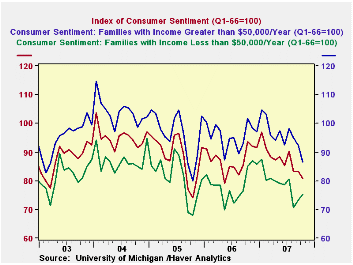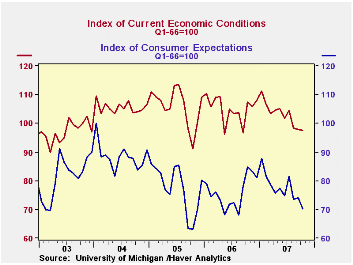 Global| Oct 26 2007
Global| Oct 26 2007Michigan Consumer Sentiment Added To Decline in Early October
by:Tom Moeller
|in:Economy in Brief
Summary
The University of Michigan's full- month reading of consumer sentiment for October fell 3.0% to 80.9. That roughly doubled the 1.7% decline reported for early October; it followed no change in September and a huge 7.7% drop in August. [...]

The University of Michigan's full- month reading of consumer sentiment for October fell 3.0% to 80.9. That roughly doubled the 1.7% decline reported for early October; it followed no change in September and a huge 7.7% drop in August. The decline was worse than Consensus expectations, which called for the number to be unchanged from the preliminary October figure of 82.0.
Both major sub-indexes shared in the erosion. Current conditions was lowered from its preliminary value of 98.2 to 97.6 and expectations from 71.6 to 70.1.
By income category, the added decline in overall sentiment reversed the early month pattern: families with greater than $50,000 per year in income had reported a reduction of -16.8% y/y, but it is now down "only" 15.1% while sentiment amongst families with income less than $50,000 per year trimmed some of its earlier m/m recovery and now shows a sizable 11.5% y/y decline.
By age group, it sentiment amongst folks in the 35-54 bracket eroded from the preliminary -17.1% y/y to -17.6%. Younger persons cut their initial assessment from +5.6% y/y to +2.3%.
Expectations about personal finances actually improved a bit from the earlier reading and are now flat with September's value; interestingly, there are now equal increases in the proportion of survey participants who expect better times ahead for themselves and in those who expect worse times. Expectations for business conditions during the next year fell for the sixth month this year out of ten. Expectations about business conditions out five years remain unattractive, with a decrease in those looking for "good times" and an increase in those expecting "bad times".
The view of the current economic conditions improved due to a slight increase in the view of current personal finances, a conclusion that is unchanged from the preliminary October survey. However, the perspective of current buying conditions turned from up slightly m/m to down slightly.
The assessment of government policy in October recovered the declines during the prior two months. This is not because more people see government doing a "good" job, but that fewer people see it doing a "poor" job; they apparently shifted to an "only fair" assessment.
The University of Michigan survey is not seasonally adjusted.The reading is based on telephone interviews with about 500 households at month-end. The summary indexes are in Haver's USECON database, with details in the proprietary UMSCA database.
Safety, Soundness, and The Evolution of U.S. Banking Industry from the Federal Reserve Bank of Atlanta can be found here.
Corporate Access to External Financing from the Federal Reserve Bank of San Francisco is available here.
| University of Michigan | October (Final) | October (Prelim.) | September | October y/y | 2006 | 2005 | 2004 |
|---|---|---|---|---|---|---|---|
| Consumer Sentiment | 80.9 | 82.0 | 83.4 | -13.6% | 87.3 | 88.5 | 95.2 |
| Current Conditions | 97.6 | 98.2 | 97.9 | -9.0% | 105.1 | 105.9 | 105.6 |
| Expectations | 70.1 | 71.6 | 74.1 | -17.3% | 75.9 | 77.4 | 88.5 |
Tom Moeller
AuthorMore in Author Profile »Prior to joining Haver Analytics in 2000, Mr. Moeller worked as the Economist at Chancellor Capital Management from 1985 to 1999. There, he developed comprehensive economic forecasts and interpreted economic data for equity and fixed income portfolio managers. Also at Chancellor, Mr. Moeller worked as an equity analyst and was responsible for researching and rating companies in the economically sensitive automobile and housing industries for investment in Chancellor’s equity portfolio. Prior to joining Chancellor, Mr. Moeller was an Economist at Citibank from 1979 to 1984. He also analyzed pricing behavior in the metals industry for the Council on Wage and Price Stability in Washington, D.C. In 1999, Mr. Moeller received the award for most accurate forecast from the Forecasters' Club of New York. From 1990 to 1992 he was President of the New York Association for Business Economists. Mr. Moeller earned an M.B.A. in Finance from Fordham University, where he graduated in 1987. He holds a Bachelor of Arts in Economics from George Washington University.
More Economy in Brief
 Global| Feb 05 2026
Global| Feb 05 2026Charts of the Week: Balanced Policy, Resilient Data and AI Narratives
by:Andrew Cates






